An Analysis of Beetroot Supplementation on Cyclist Performance
VerifiedAdded on 2022/12/27
|11
|3985
|83
Essay
AI Summary
This essay investigates the effects of beetroot supplementation on cyclists' performance, drawing from a literature review of multiple studies. The introduction highlights the importance of leg power and the Wingate test for assessing anaerobic capacity, as well as the nutritional benefits of beetroot for athletes. The main body synthesizes findings from various articles, examining the impact of beetroot juice on factors such as peak isometric force, maximal cycling power, eccentric and concentric muscle power, and sprint performance. The studies use protocols like the Wingate test to measure the effects of beetroot supplementation on trained athletes, assessing outcomes such as time to peak power, exercise tolerance, and muscle fatigue. The essay also discusses the role of dietary nitrate in enhancing muscle power and reducing perceived exertion. The analysis reveals that beetroot supplementation can improve performance in short-duration sprints, increase muscular force production, and reduce fatigue, particularly in the initial stages of exercise. The conclusion synthesizes these findings, emphasizing the potential of beetroot as an ergogenic aid for cyclists and the need for further research to optimize dosage and application.

Sports nutrition
1
1
Paraphrase This Document
Need a fresh take? Get an instant paraphrase of this document with our AI Paraphraser
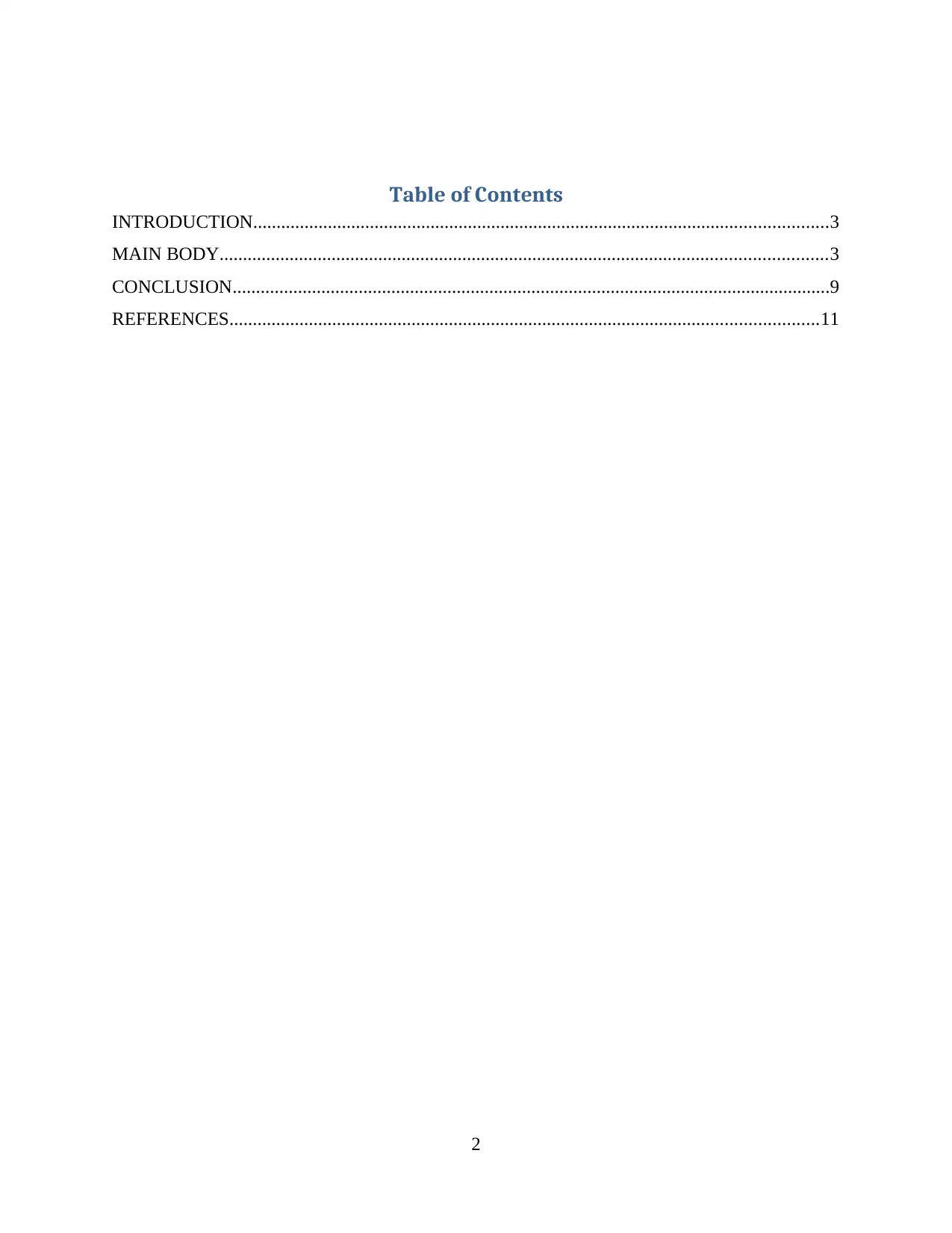
Table of Contents
INTRODUCTION...........................................................................................................................3
MAIN BODY..................................................................................................................................3
CONCLUSION................................................................................................................................9
REFERENCES..............................................................................................................................11
2
INTRODUCTION...........................................................................................................................3
MAIN BODY..................................................................................................................................3
CONCLUSION................................................................................................................................9
REFERENCES..............................................................................................................................11
2
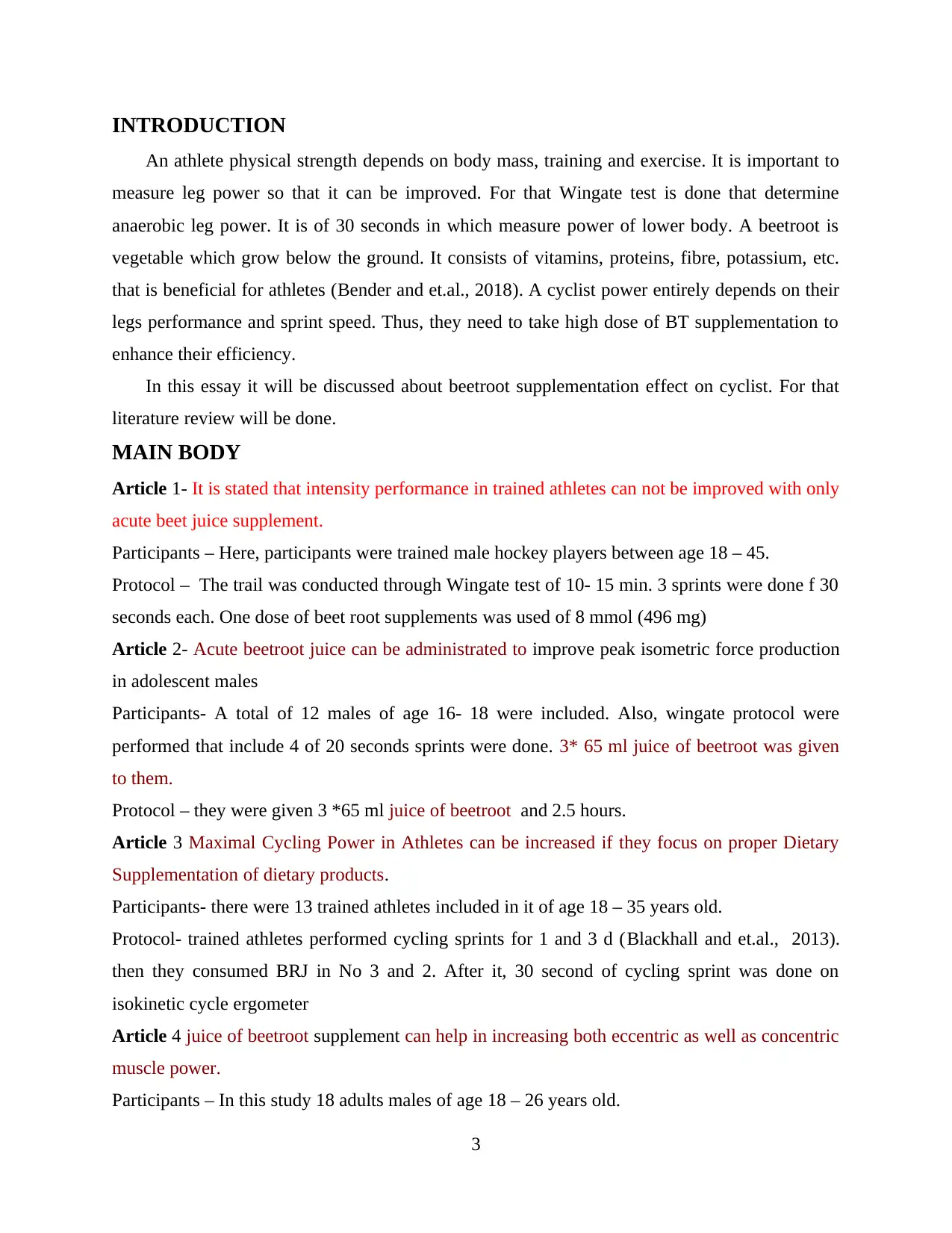
INTRODUCTION
An athlete physical strength depends on body mass, training and exercise. It is important to
measure leg power so that it can be improved. For that Wingate test is done that determine
anaerobic leg power. It is of 30 seconds in which measure power of lower body. A beetroot is
vegetable which grow below the ground. It consists of vitamins, proteins, fibre, potassium, etc.
that is beneficial for athletes (Bender and et.al., 2018). A cyclist power entirely depends on their
legs performance and sprint speed. Thus, they need to take high dose of BT supplementation to
enhance their efficiency.
In this essay it will be discussed about beetroot supplementation effect on cyclist. For that
literature review will be done.
MAIN BODY
Article 1- It is stated that intensity performance in trained athletes can not be improved with only
acute beet juice supplement.
Participants – Here, participants were trained male hockey players between age 18 – 45.
Protocol – The trail was conducted through Wingate test of 10- 15 min. 3 sprints were done f 30
seconds each. One dose of beet root supplements was used of 8 mmol (496 mg)
Article 2- Acute beetroot juice can be administrated to improve peak isometric force production
in adolescent males
Participants- A total of 12 males of age 16- 18 were included. Also, wingate protocol were
performed that include 4 of 20 seconds sprints were done. 3* 65 ml juice of beetroot was given
to them.
Protocol – they were given 3 *65 ml juice of beetroot and 2.5 hours.
Article 3 Maximal Cycling Power in Athletes can be increased if they focus on proper Dietary
Supplementation of dietary products.
Participants- there were 13 trained athletes included in it of age 18 – 35 years old.
Protocol- trained athletes performed cycling sprints for 1 and 3 d (Blackhall and et.al., 2013).
then they consumed BRJ in No 3 and 2. After it, 30 second of cycling sprint was done on
isokinetic cycle ergometer
Article 4 juice of beetroot supplement can help in increasing both eccentric as well as concentric
muscle power.
Participants – In this study 18 adults males of age 18 – 26 years old.
3
An athlete physical strength depends on body mass, training and exercise. It is important to
measure leg power so that it can be improved. For that Wingate test is done that determine
anaerobic leg power. It is of 30 seconds in which measure power of lower body. A beetroot is
vegetable which grow below the ground. It consists of vitamins, proteins, fibre, potassium, etc.
that is beneficial for athletes (Bender and et.al., 2018). A cyclist power entirely depends on their
legs performance and sprint speed. Thus, they need to take high dose of BT supplementation to
enhance their efficiency.
In this essay it will be discussed about beetroot supplementation effect on cyclist. For that
literature review will be done.
MAIN BODY
Article 1- It is stated that intensity performance in trained athletes can not be improved with only
acute beet juice supplement.
Participants – Here, participants were trained male hockey players between age 18 – 45.
Protocol – The trail was conducted through Wingate test of 10- 15 min. 3 sprints were done f 30
seconds each. One dose of beet root supplements was used of 8 mmol (496 mg)
Article 2- Acute beetroot juice can be administrated to improve peak isometric force production
in adolescent males
Participants- A total of 12 males of age 16- 18 were included. Also, wingate protocol were
performed that include 4 of 20 seconds sprints were done. 3* 65 ml juice of beetroot was given
to them.
Protocol – they were given 3 *65 ml juice of beetroot and 2.5 hours.
Article 3 Maximal Cycling Power in Athletes can be increased if they focus on proper Dietary
Supplementation of dietary products.
Participants- there were 13 trained athletes included in it of age 18 – 35 years old.
Protocol- trained athletes performed cycling sprints for 1 and 3 d (Blackhall and et.al., 2013).
then they consumed BRJ in No 3 and 2. After it, 30 second of cycling sprint was done on
isokinetic cycle ergometer
Article 4 juice of beetroot supplement can help in increasing both eccentric as well as concentric
muscle power.
Participants – In this study 18 adults males of age 18 – 26 years old.
3
⊘ This is a preview!⊘
Do you want full access?
Subscribe today to unlock all pages.

Trusted by 1+ million students worldwide
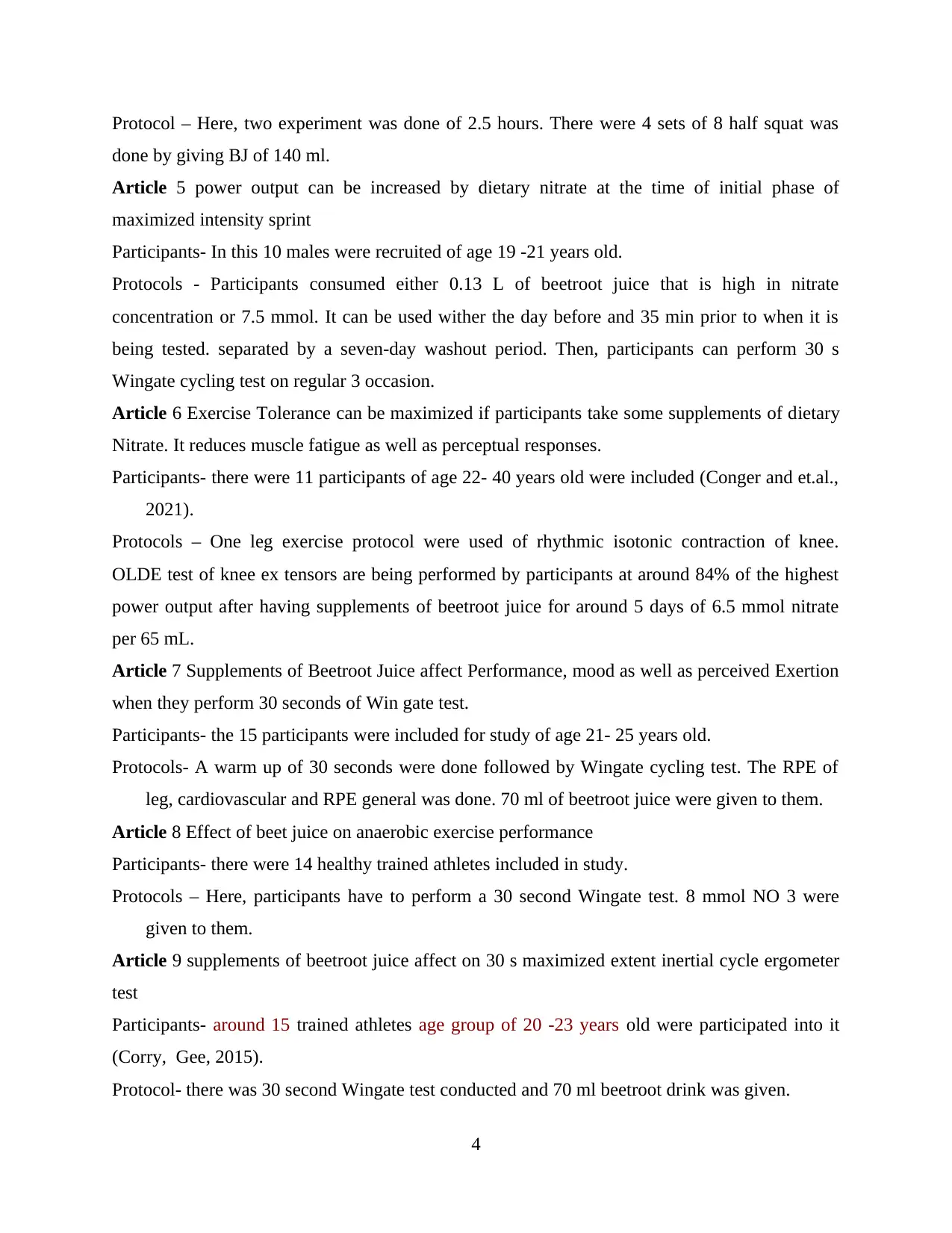
Protocol – Here, two experiment was done of 2.5 hours. There were 4 sets of 8 half squat was
done by giving BJ of 140 ml.
Article 5 power output can be increased by dietary nitrate at the time of initial phase of
maximized intensity sprint
Participants- In this 10 males were recruited of age 19 -21 years old.
Protocols - Participants consumed either 0.13 L of beetroot juice that is high in nitrate
concentration or 7.5 mmol. It can be used wither the day before and 35 min prior to when it is
being tested. separated by a seven-day washout period. Then, participants can perform 30 s
Wingate cycling test on regular 3 occasion.
Article 6 Exercise Tolerance can be maximized if participants take some supplements of dietary
Nitrate. It reduces muscle fatigue as well as perceptual responses.
Participants- there were 11 participants of age 22- 40 years old were included (Conger and et.al.,
2021).
Protocols – One leg exercise protocol were used of rhythmic isotonic contraction of knee.
OLDE test of knee ex tensors are being performed by participants at around 84% of the highest
power output after having supplements of beetroot juice for around 5 days of 6.5 mmol nitrate
per 65 mL.
Article 7 Supplements of Beetroot Juice affect Performance, mood as well as perceived Exertion
when they perform 30 seconds of Win gate test.
Participants- the 15 participants were included for study of age 21- 25 years old.
Protocols- A warm up of 30 seconds were done followed by Wingate cycling test. The RPE of
leg, cardiovascular and RPE general was done. 70 ml of beetroot juice were given to them.
Article 8 Effect of beet juice on anaerobic exercise performance
Participants- there were 14 healthy trained athletes included in study.
Protocols – Here, participants have to perform a 30 second Wingate test. 8 mmol NO 3 were
given to them.
Article 9 supplements of beetroot juice affect on 30 s maximized extent inertial cycle ergometer
test
Participants- around 15 trained athletes age group of 20 -23 years old were participated into it
(Corry, Gee, 2015).
Protocol- there was 30 second Wingate test conducted and 70 ml beetroot drink was given.
4
done by giving BJ of 140 ml.
Article 5 power output can be increased by dietary nitrate at the time of initial phase of
maximized intensity sprint
Participants- In this 10 males were recruited of age 19 -21 years old.
Protocols - Participants consumed either 0.13 L of beetroot juice that is high in nitrate
concentration or 7.5 mmol. It can be used wither the day before and 35 min prior to when it is
being tested. separated by a seven-day washout period. Then, participants can perform 30 s
Wingate cycling test on regular 3 occasion.
Article 6 Exercise Tolerance can be maximized if participants take some supplements of dietary
Nitrate. It reduces muscle fatigue as well as perceptual responses.
Participants- there were 11 participants of age 22- 40 years old were included (Conger and et.al.,
2021).
Protocols – One leg exercise protocol were used of rhythmic isotonic contraction of knee.
OLDE test of knee ex tensors are being performed by participants at around 84% of the highest
power output after having supplements of beetroot juice for around 5 days of 6.5 mmol nitrate
per 65 mL.
Article 7 Supplements of Beetroot Juice affect Performance, mood as well as perceived Exertion
when they perform 30 seconds of Win gate test.
Participants- the 15 participants were included for study of age 21- 25 years old.
Protocols- A warm up of 30 seconds were done followed by Wingate cycling test. The RPE of
leg, cardiovascular and RPE general was done. 70 ml of beetroot juice were given to them.
Article 8 Effect of beet juice on anaerobic exercise performance
Participants- there were 14 healthy trained athletes included in study.
Protocols – Here, participants have to perform a 30 second Wingate test. 8 mmol NO 3 were
given to them.
Article 9 supplements of beetroot juice affect on 30 s maximized extent inertial cycle ergometer
test
Participants- around 15 trained athletes age group of 20 -23 years old were participated into it
(Corry, Gee, 2015).
Protocol- there was 30 second Wingate test conducted and 70 ml beetroot drink was given.
4
Paraphrase This Document
Need a fresh take? Get an instant paraphrase of this document with our AI Paraphraser
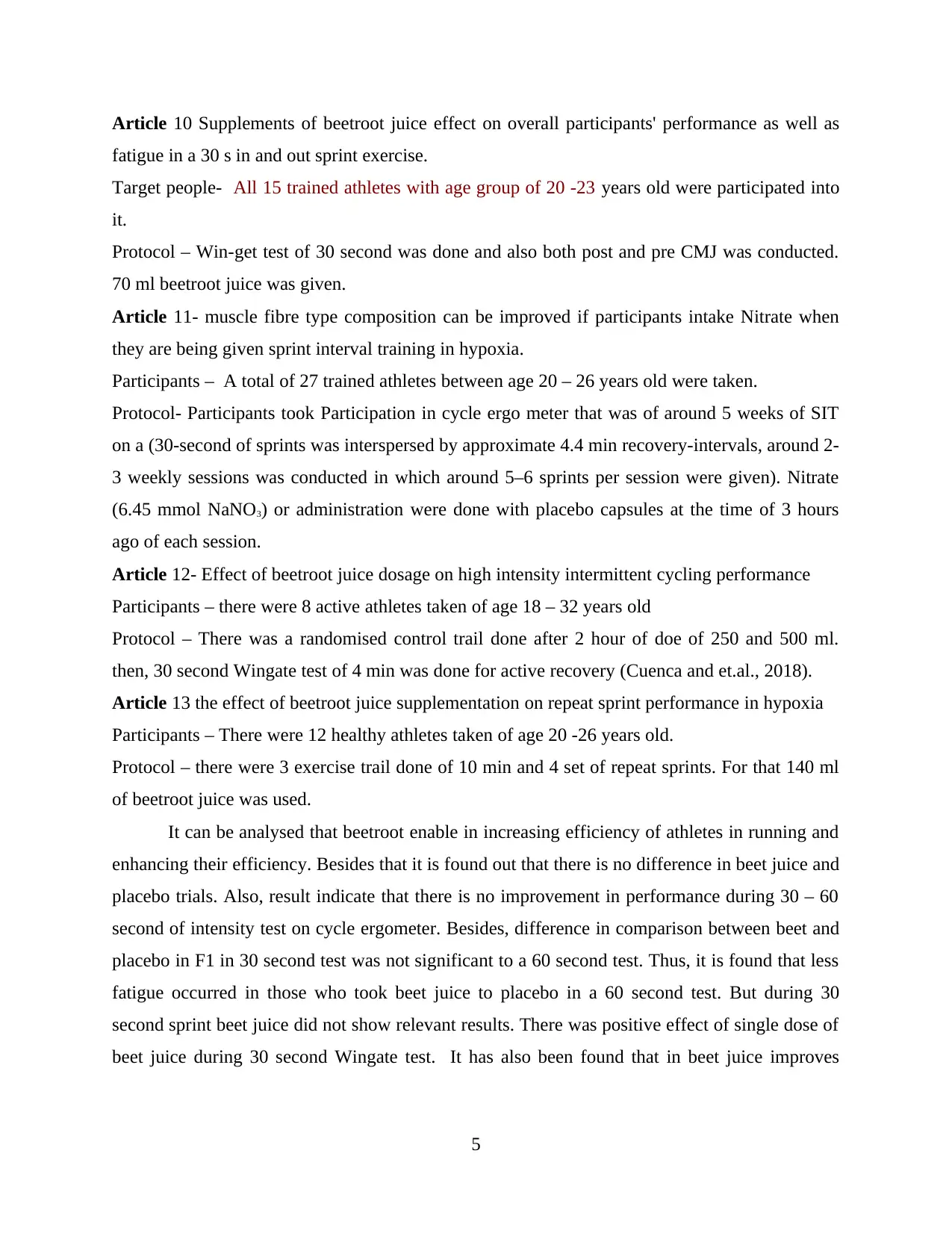
Article 10 Supplements of beetroot juice effect on overall participants' performance as well as
fatigue in a 30 s in and out sprint exercise.
Target people- All 15 trained athletes with age group of 20 -23 years old were participated into
it.
Protocol – Win-get test of 30 second was done and also both post and pre CMJ was conducted.
70 ml beetroot juice was given.
Article 11- muscle fibre type composition can be improved if participants intake Nitrate when
they are being given sprint interval training in hypoxia.
Participants – A total of 27 trained athletes between age 20 – 26 years old were taken.
Protocol- Participants took Participation in cycle ergo meter that was of around 5 weeks of SIT
on a (30-second of sprints was interspersed by approximate 4.4 min recovery-intervals, around 2-
3 weekly sessions was conducted in which around 5–6 sprints per session were given). Nitrate
(6.45 mmol NaNO3) or administration were done with placebo capsules at the time of 3 hours
ago of each session.
Article 12- Effect of beetroot juice dosage on high intensity intermittent cycling performance
Participants – there were 8 active athletes taken of age 18 – 32 years old
Protocol – There was a randomised control trail done after 2 hour of doe of 250 and 500 ml.
then, 30 second Wingate test of 4 min was done for active recovery (Cuenca and et.al., 2018).
Article 13 the effect of beetroot juice supplementation on repeat sprint performance in hypoxia
Participants – There were 12 healthy athletes taken of age 20 -26 years old.
Protocol – there were 3 exercise trail done of 10 min and 4 set of repeat sprints. For that 140 ml
of beetroot juice was used.
It can be analysed that beetroot enable in increasing efficiency of athletes in running and
enhancing their efficiency. Besides that it is found out that there is no difference in beet juice and
placebo trials. Also, result indicate that there is no improvement in performance during 30 – 60
second of intensity test on cycle ergometer. Besides, difference in comparison between beet and
placebo in F1 in 30 second test was not significant to a 60 second test. Thus, it is found that less
fatigue occurred in those who took beet juice to placebo in a 60 second test. But during 30
second sprint beet juice did not show relevant results. There was positive effect of single dose of
beet juice during 30 second Wingate test. It has also been found that in beet juice improves
5
fatigue in a 30 s in and out sprint exercise.
Target people- All 15 trained athletes with age group of 20 -23 years old were participated into
it.
Protocol – Win-get test of 30 second was done and also both post and pre CMJ was conducted.
70 ml beetroot juice was given.
Article 11- muscle fibre type composition can be improved if participants intake Nitrate when
they are being given sprint interval training in hypoxia.
Participants – A total of 27 trained athletes between age 20 – 26 years old were taken.
Protocol- Participants took Participation in cycle ergo meter that was of around 5 weeks of SIT
on a (30-second of sprints was interspersed by approximate 4.4 min recovery-intervals, around 2-
3 weekly sessions was conducted in which around 5–6 sprints per session were given). Nitrate
(6.45 mmol NaNO3) or administration were done with placebo capsules at the time of 3 hours
ago of each session.
Article 12- Effect of beetroot juice dosage on high intensity intermittent cycling performance
Participants – there were 8 active athletes taken of age 18 – 32 years old
Protocol – There was a randomised control trail done after 2 hour of doe of 250 and 500 ml.
then, 30 second Wingate test of 4 min was done for active recovery (Cuenca and et.al., 2018).
Article 13 the effect of beetroot juice supplementation on repeat sprint performance in hypoxia
Participants – There were 12 healthy athletes taken of age 20 -26 years old.
Protocol – there were 3 exercise trail done of 10 min and 4 set of repeat sprints. For that 140 ml
of beetroot juice was used.
It can be analysed that beetroot enable in increasing efficiency of athletes in running and
enhancing their efficiency. Besides that it is found out that there is no difference in beet juice and
placebo trials. Also, result indicate that there is no improvement in performance during 30 – 60
second of intensity test on cycle ergometer. Besides, difference in comparison between beet and
placebo in F1 in 30 second test was not significant to a 60 second test. Thus, it is found that less
fatigue occurred in those who took beet juice to placebo in a 60 second test. But during 30
second sprint beet juice did not show relevant results. There was positive effect of single dose of
beet juice during 30 second Wingate test. It has also been found that in beet juice improves
5
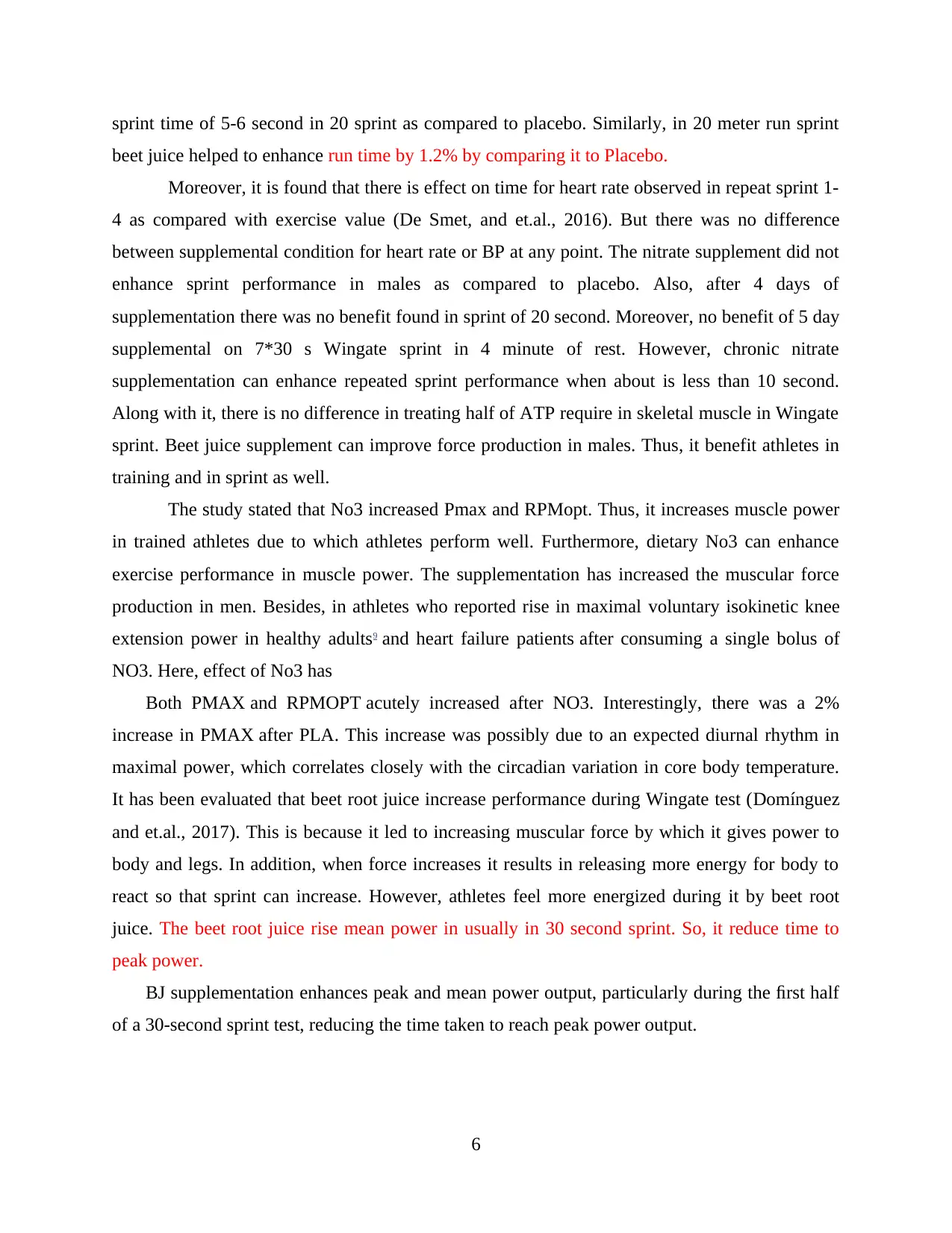
sprint time of 5-6 second in 20 sprint as compared to placebo. Similarly, in 20 meter run sprint
beet juice helped to enhance run time by 1.2% by comparing it to Placebo.
Moreover, it is found that there is effect on time for heart rate observed in repeat sprint 1-
4 as compared with exercise value (De Smet, and et.al., 2016). But there was no difference
between supplemental condition for heart rate or BP at any point. The nitrate supplement did not
enhance sprint performance in males as compared to placebo. Also, after 4 days of
supplementation there was no benefit found in sprint of 20 second. Moreover, no benefit of 5 day
supplemental on 7*30 s Wingate sprint in 4 minute of rest. However, chronic nitrate
supplementation can enhance repeated sprint performance when about is less than 10 second.
Along with it, there is no difference in treating half of ATP require in skeletal muscle in Wingate
sprint. Beet juice supplement can improve force production in males. Thus, it benefit athletes in
training and in sprint as well.
The study stated that No3 increased Pmax and RPMopt. Thus, it increases muscle power
in trained athletes due to which athletes perform well. Furthermore, dietary No3 can enhance
exercise performance in muscle power. The supplementation has increased the muscular force
production in men. Besides, in athletes who reported rise in maximal voluntary isokinetic knee
extension power in healthy adults9 and heart failure patients after consuming a single bolus of
NO3. Here, effect of No3 has
Both PMAX and RPMOPT acutely increased after NO3. Interestingly, there was a 2%
increase in PMAX after PLA. This increase was possibly due to an expected diurnal rhythm in
maximal power, which correlates closely with the circadian variation in core body temperature.
It has been evaluated that beet root juice increase performance during Wingate test (Domínguez
and et.al., 2017). This is because it led to increasing muscular force by which it gives power to
body and legs. In addition, when force increases it results in releasing more energy for body to
react so that sprint can increase. However, athletes feel more energized during it by beet root
juice. The beet root juice rise mean power in usually in 30 second sprint. So, it reduce time to
peak power.
BJ supplementation enhances peak and mean power output, particularly during the first half
of a 30-second sprint test, reducing the time taken to reach peak power output.
6
beet juice helped to enhance run time by 1.2% by comparing it to Placebo.
Moreover, it is found that there is effect on time for heart rate observed in repeat sprint 1-
4 as compared with exercise value (De Smet, and et.al., 2016). But there was no difference
between supplemental condition for heart rate or BP at any point. The nitrate supplement did not
enhance sprint performance in males as compared to placebo. Also, after 4 days of
supplementation there was no benefit found in sprint of 20 second. Moreover, no benefit of 5 day
supplemental on 7*30 s Wingate sprint in 4 minute of rest. However, chronic nitrate
supplementation can enhance repeated sprint performance when about is less than 10 second.
Along with it, there is no difference in treating half of ATP require in skeletal muscle in Wingate
sprint. Beet juice supplement can improve force production in males. Thus, it benefit athletes in
training and in sprint as well.
The study stated that No3 increased Pmax and RPMopt. Thus, it increases muscle power
in trained athletes due to which athletes perform well. Furthermore, dietary No3 can enhance
exercise performance in muscle power. The supplementation has increased the muscular force
production in men. Besides, in athletes who reported rise in maximal voluntary isokinetic knee
extension power in healthy adults9 and heart failure patients after consuming a single bolus of
NO3. Here, effect of No3 has
Both PMAX and RPMOPT acutely increased after NO3. Interestingly, there was a 2%
increase in PMAX after PLA. This increase was possibly due to an expected diurnal rhythm in
maximal power, which correlates closely with the circadian variation in core body temperature.
It has been evaluated that beet root juice increase performance during Wingate test (Domínguez
and et.al., 2017). This is because it led to increasing muscular force by which it gives power to
body and legs. In addition, when force increases it results in releasing more energy for body to
react so that sprint can increase. However, athletes feel more energized during it by beet root
juice. The beet root juice rise mean power in usually in 30 second sprint. So, it reduce time to
peak power.
BJ supplementation enhances peak and mean power output, particularly during the first half
of a 30-second sprint test, reducing the time taken to reach peak power output.
6
⊘ This is a preview!⊘
Do you want full access?
Subscribe today to unlock all pages.

Trusted by 1+ million students worldwide
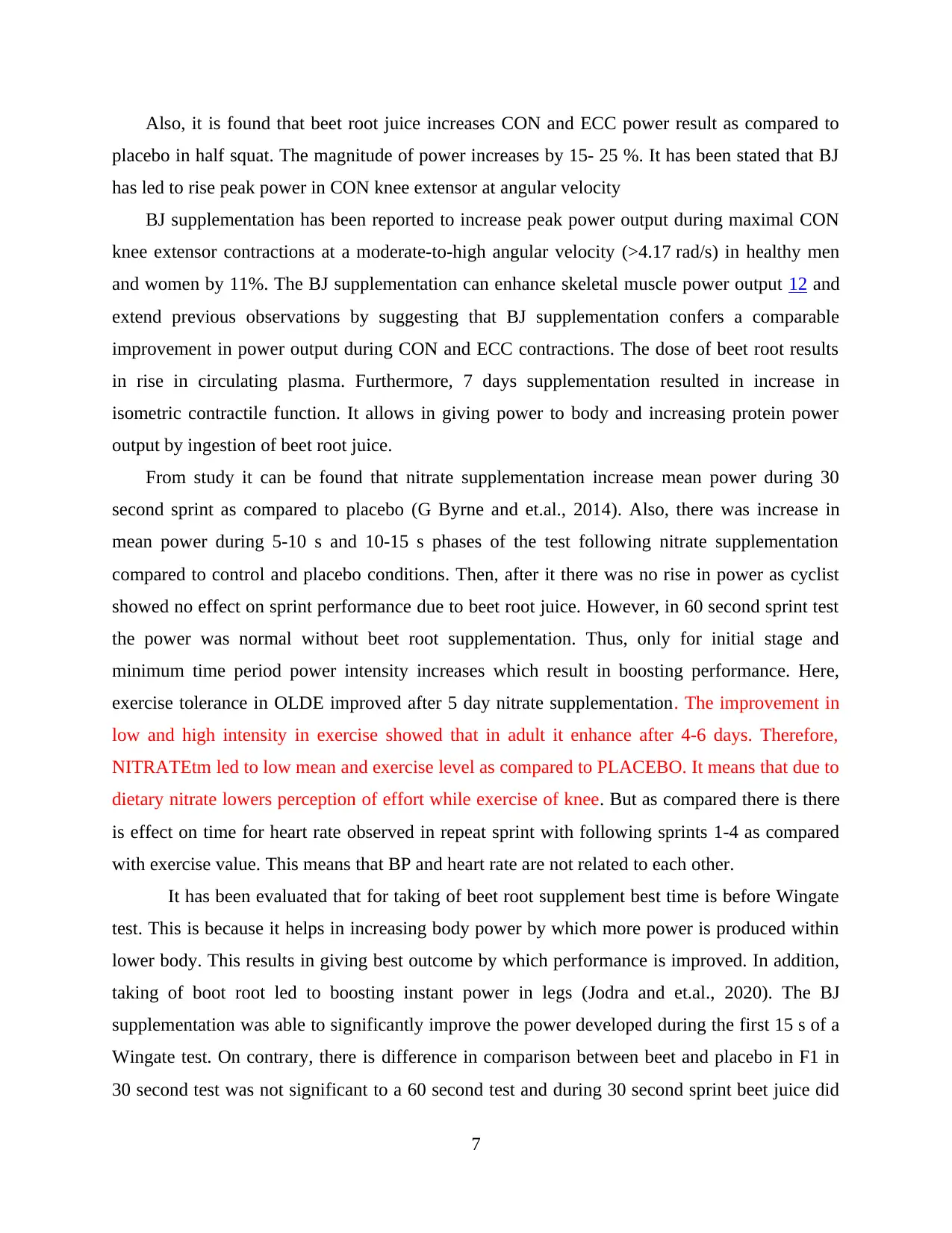
Also, it is found that beet root juice increases CON and ECC power result as compared to
placebo in half squat. The magnitude of power increases by 15- 25 %. It has been stated that BJ
has led to rise peak power in CON knee extensor at angular velocity
BJ supplementation has been reported to increase peak power output during maximal CON
knee extensor contractions at a moderate-to-high angular velocity (>4.17 rad/s) in healthy men
and women by 11%. The BJ supplementation can enhance skeletal muscle power output 12 and
extend previous observations by suggesting that BJ supplementation confers a comparable
improvement in power output during CON and ECC contractions. The dose of beet root results
in rise in circulating plasma. Furthermore, 7 days supplementation resulted in increase in
isometric contractile function. It allows in giving power to body and increasing protein power
output by ingestion of beet root juice.
From study it can be found that nitrate supplementation increase mean power during 30
second sprint as compared to placebo (G Byrne and et.al., 2014). Also, there was increase in
mean power during 5-10 s and 10-15 s phases of the test following nitrate supplementation
compared to control and placebo conditions. Then, after it there was no rise in power as cyclist
showed no effect on sprint performance due to beet root juice. However, in 60 second sprint test
the power was normal without beet root supplementation. Thus, only for initial stage and
minimum time period power intensity increases which result in boosting performance. Here,
exercise tolerance in OLDE improved after 5 day nitrate supplementation. The improvement in
low and high intensity in exercise showed that in adult it enhance after 4-6 days. Therefore,
NITRATEtm led to low mean and exercise level as compared to PLACEBO. It means that due to
dietary nitrate lowers perception of effort while exercise of knee. But as compared there is there
is effect on time for heart rate observed in repeat sprint with following sprints 1-4 as compared
with exercise value. This means that BP and heart rate are not related to each other.
It has been evaluated that for taking of beet root supplement best time is before Wingate
test. This is because it helps in increasing body power by which more power is produced within
lower body. This results in giving best outcome by which performance is improved. In addition,
taking of boot root led to boosting instant power in legs (Jodra and et.al., 2020). The BJ
supplementation was able to significantly improve the power developed during the first 15 s of a
Wingate test. On contrary, there is difference in comparison between beet and placebo in F1 in
30 second test was not significant to a 60 second test and during 30 second sprint beet juice did
7
placebo in half squat. The magnitude of power increases by 15- 25 %. It has been stated that BJ
has led to rise peak power in CON knee extensor at angular velocity
BJ supplementation has been reported to increase peak power output during maximal CON
knee extensor contractions at a moderate-to-high angular velocity (>4.17 rad/s) in healthy men
and women by 11%. The BJ supplementation can enhance skeletal muscle power output 12 and
extend previous observations by suggesting that BJ supplementation confers a comparable
improvement in power output during CON and ECC contractions. The dose of beet root results
in rise in circulating plasma. Furthermore, 7 days supplementation resulted in increase in
isometric contractile function. It allows in giving power to body and increasing protein power
output by ingestion of beet root juice.
From study it can be found that nitrate supplementation increase mean power during 30
second sprint as compared to placebo (G Byrne and et.al., 2014). Also, there was increase in
mean power during 5-10 s and 10-15 s phases of the test following nitrate supplementation
compared to control and placebo conditions. Then, after it there was no rise in power as cyclist
showed no effect on sprint performance due to beet root juice. However, in 60 second sprint test
the power was normal without beet root supplementation. Thus, only for initial stage and
minimum time period power intensity increases which result in boosting performance. Here,
exercise tolerance in OLDE improved after 5 day nitrate supplementation. The improvement in
low and high intensity in exercise showed that in adult it enhance after 4-6 days. Therefore,
NITRATEtm led to low mean and exercise level as compared to PLACEBO. It means that due to
dietary nitrate lowers perception of effort while exercise of knee. But as compared there is there
is effect on time for heart rate observed in repeat sprint with following sprints 1-4 as compared
with exercise value. This means that BP and heart rate are not related to each other.
It has been evaluated that for taking of beet root supplement best time is before Wingate
test. This is because it helps in increasing body power by which more power is produced within
lower body. This results in giving best outcome by which performance is improved. In addition,
taking of boot root led to boosting instant power in legs (Jodra and et.al., 2020). The BJ
supplementation was able to significantly improve the power developed during the first 15 s of a
Wingate test. On contrary, there is difference in comparison between beet and placebo in F1 in
30 second test was not significant to a 60 second test and during 30 second sprint beet juice did
7
Paraphrase This Document
Need a fresh take? Get an instant paraphrase of this document with our AI Paraphraser
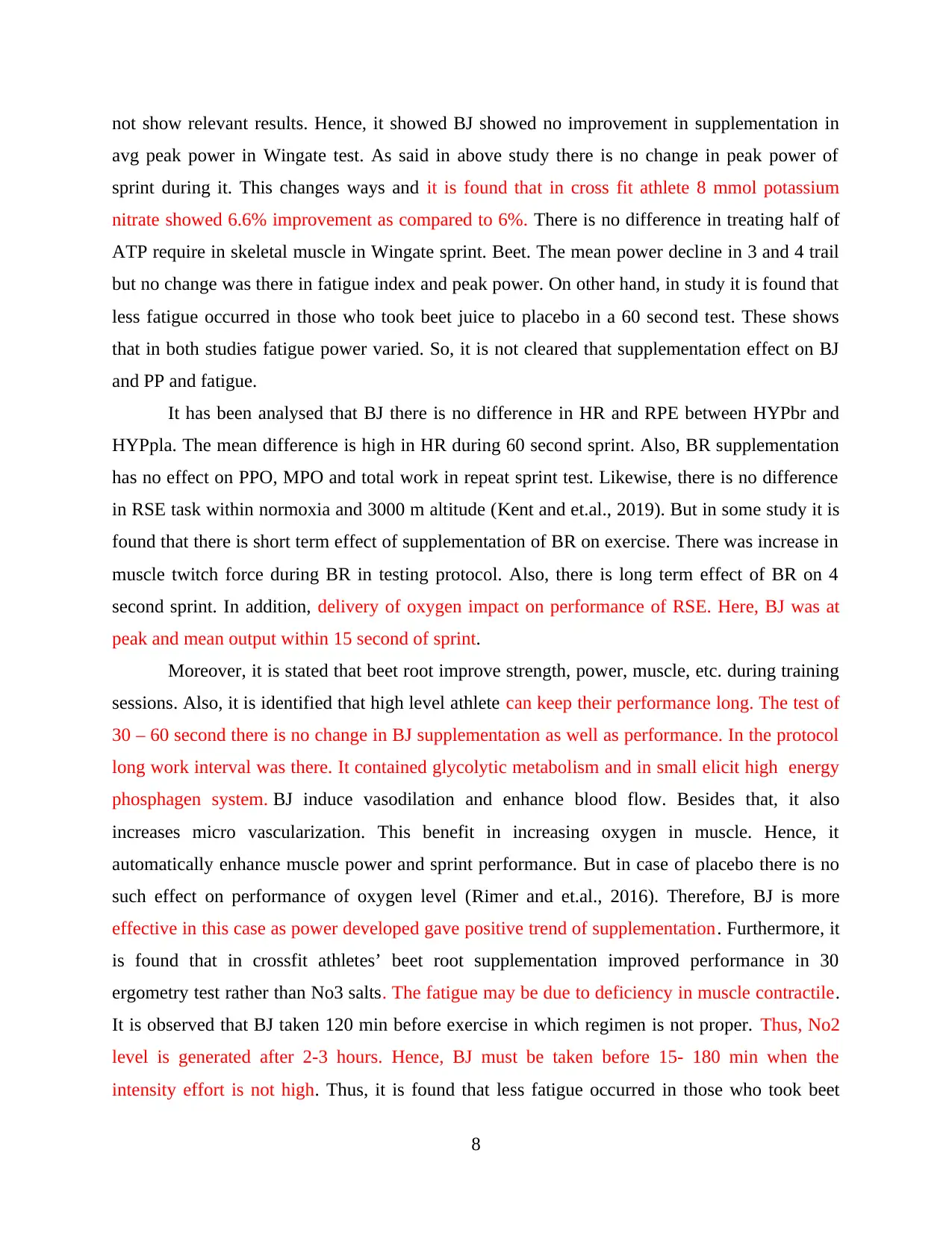
not show relevant results. Hence, it showed BJ showed no improvement in supplementation in
avg peak power in Wingate test. As said in above study there is no change in peak power of
sprint during it. This changes ways and it is found that in cross fit athlete 8 mmol potassium
nitrate showed 6.6% improvement as compared to 6%. There is no difference in treating half of
ATP require in skeletal muscle in Wingate sprint. Beet. The mean power decline in 3 and 4 trail
but no change was there in fatigue index and peak power. On other hand, in study it is found that
less fatigue occurred in those who took beet juice to placebo in a 60 second test. These shows
that in both studies fatigue power varied. So, it is not cleared that supplementation effect on BJ
and PP and fatigue.
It has been analysed that BJ there is no difference in HR and RPE between HYPbr and
HYPpla. The mean difference is high in HR during 60 second sprint. Also, BR supplementation
has no effect on PPO, MPO and total work in repeat sprint test. Likewise, there is no difference
in RSE task within normoxia and 3000 m altitude (Kent and et.al., 2019). But in some study it is
found that there is short term effect of supplementation of BR on exercise. There was increase in
muscle twitch force during BR in testing protocol. Also, there is long term effect of BR on 4
second sprint. In addition, delivery of oxygen impact on performance of RSE. Here, BJ was at
peak and mean output within 15 second of sprint.
Moreover, it is stated that beet root improve strength, power, muscle, etc. during training
sessions. Also, it is identified that high level athlete can keep their performance long. The test of
30 – 60 second there is no change in BJ supplementation as well as performance. In the protocol
long work interval was there. It contained glycolytic metabolism and in small elicit high energy
phosphagen system. BJ induce vasodilation and enhance blood flow. Besides that, it also
increases micro vascularization. This benefit in increasing oxygen in muscle. Hence, it
automatically enhance muscle power and sprint performance. But in case of placebo there is no
such effect on performance of oxygen level (Rimer and et.al., 2016). Therefore, BJ is more
effective in this case as power developed gave positive trend of supplementation. Furthermore, it
is found that in crossfit athletes’ beet root supplementation improved performance in 30
ergometry test rather than No3 salts. The fatigue may be due to deficiency in muscle contractile.
It is observed that BJ taken 120 min before exercise in which regimen is not proper. Thus, No2
level is generated after 2-3 hours. Hence, BJ must be taken before 15- 180 min when the
intensity effort is not high. Thus, it is found that less fatigue occurred in those who took beet
8
avg peak power in Wingate test. As said in above study there is no change in peak power of
sprint during it. This changes ways and it is found that in cross fit athlete 8 mmol potassium
nitrate showed 6.6% improvement as compared to 6%. There is no difference in treating half of
ATP require in skeletal muscle in Wingate sprint. Beet. The mean power decline in 3 and 4 trail
but no change was there in fatigue index and peak power. On other hand, in study it is found that
less fatigue occurred in those who took beet juice to placebo in a 60 second test. These shows
that in both studies fatigue power varied. So, it is not cleared that supplementation effect on BJ
and PP and fatigue.
It has been analysed that BJ there is no difference in HR and RPE between HYPbr and
HYPpla. The mean difference is high in HR during 60 second sprint. Also, BR supplementation
has no effect on PPO, MPO and total work in repeat sprint test. Likewise, there is no difference
in RSE task within normoxia and 3000 m altitude (Kent and et.al., 2019). But in some study it is
found that there is short term effect of supplementation of BR on exercise. There was increase in
muscle twitch force during BR in testing protocol. Also, there is long term effect of BR on 4
second sprint. In addition, delivery of oxygen impact on performance of RSE. Here, BJ was at
peak and mean output within 15 second of sprint.
Moreover, it is stated that beet root improve strength, power, muscle, etc. during training
sessions. Also, it is identified that high level athlete can keep their performance long. The test of
30 – 60 second there is no change in BJ supplementation as well as performance. In the protocol
long work interval was there. It contained glycolytic metabolism and in small elicit high energy
phosphagen system. BJ induce vasodilation and enhance blood flow. Besides that, it also
increases micro vascularization. This benefit in increasing oxygen in muscle. Hence, it
automatically enhance muscle power and sprint performance. But in case of placebo there is no
such effect on performance of oxygen level (Rimer and et.al., 2016). Therefore, BJ is more
effective in this case as power developed gave positive trend of supplementation. Furthermore, it
is found that in crossfit athletes’ beet root supplementation improved performance in 30
ergometry test rather than No3 salts. The fatigue may be due to deficiency in muscle contractile.
It is observed that BJ taken 120 min before exercise in which regimen is not proper. Thus, No2
level is generated after 2-3 hours. Hence, BJ must be taken before 15- 180 min when the
intensity effort is not high. Thus, it is found that less fatigue occurred in those who took beet
8
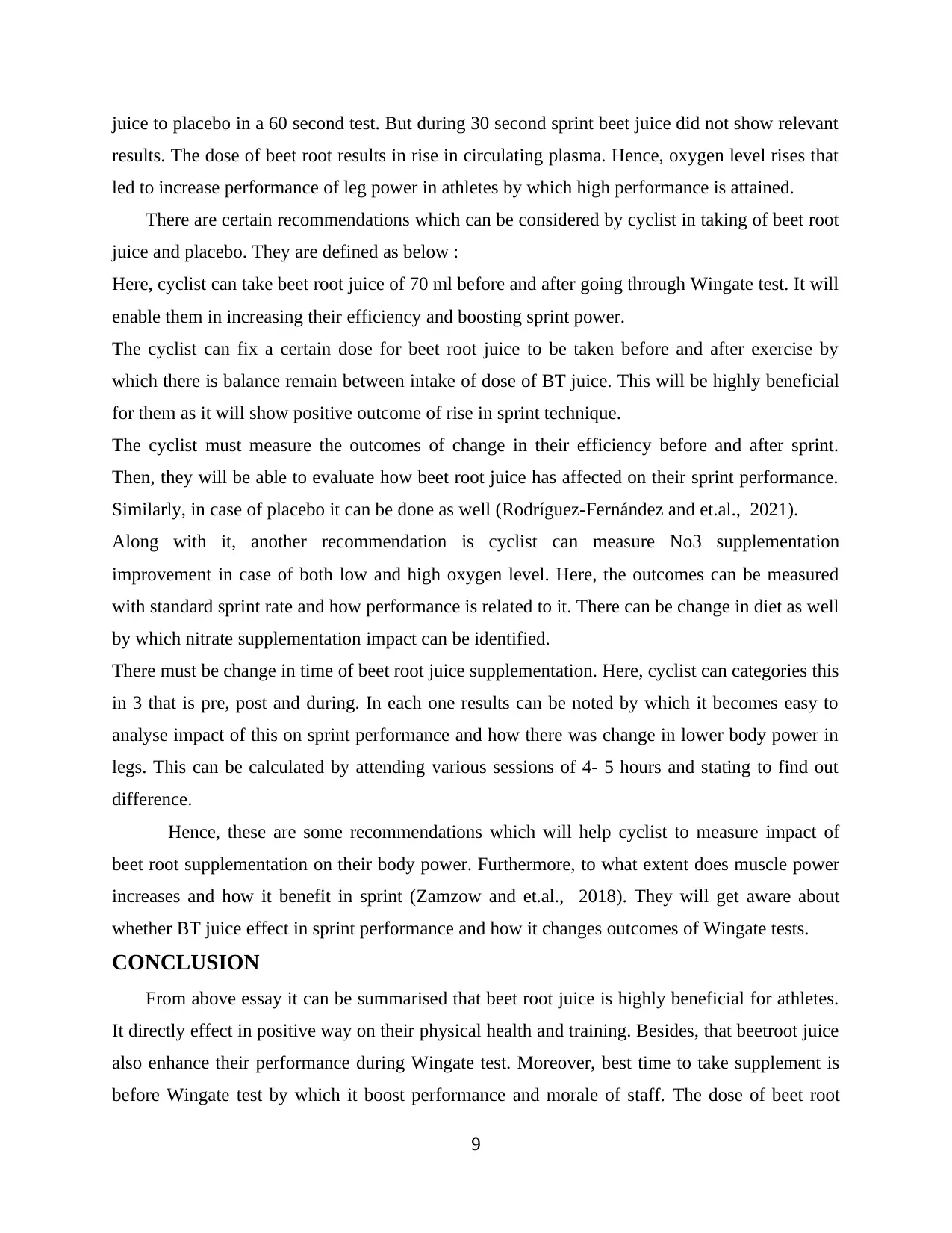
juice to placebo in a 60 second test. But during 30 second sprint beet juice did not show relevant
results. The dose of beet root results in rise in circulating plasma. Hence, oxygen level rises that
led to increase performance of leg power in athletes by which high performance is attained.
There are certain recommendations which can be considered by cyclist in taking of beet root
juice and placebo. They are defined as below :
Here, cyclist can take beet root juice of 70 ml before and after going through Wingate test. It will
enable them in increasing their efficiency and boosting sprint power.
The cyclist can fix a certain dose for beet root juice to be taken before and after exercise by
which there is balance remain between intake of dose of BT juice. This will be highly beneficial
for them as it will show positive outcome of rise in sprint technique.
The cyclist must measure the outcomes of change in their efficiency before and after sprint.
Then, they will be able to evaluate how beet root juice has affected on their sprint performance.
Similarly, in case of placebo it can be done as well (Rodríguez-Fernández and et.al., 2021).
Along with it, another recommendation is cyclist can measure No3 supplementation
improvement in case of both low and high oxygen level. Here, the outcomes can be measured
with standard sprint rate and how performance is related to it. There can be change in diet as well
by which nitrate supplementation impact can be identified.
There must be change in time of beet root juice supplementation. Here, cyclist can categories this
in 3 that is pre, post and during. In each one results can be noted by which it becomes easy to
analyse impact of this on sprint performance and how there was change in lower body power in
legs. This can be calculated by attending various sessions of 4- 5 hours and stating to find out
difference.
Hence, these are some recommendations which will help cyclist to measure impact of
beet root supplementation on their body power. Furthermore, to what extent does muscle power
increases and how it benefit in sprint (Zamzow and et.al., 2018). They will get aware about
whether BT juice effect in sprint performance and how it changes outcomes of Wingate tests.
CONCLUSION
From above essay it can be summarised that beet root juice is highly beneficial for athletes.
It directly effect in positive way on their physical health and training. Besides, that beetroot juice
also enhance their performance during Wingate test. Moreover, best time to take supplement is
before Wingate test by which it boost performance and morale of staff. The dose of beet root
9
results. The dose of beet root results in rise in circulating plasma. Hence, oxygen level rises that
led to increase performance of leg power in athletes by which high performance is attained.
There are certain recommendations which can be considered by cyclist in taking of beet root
juice and placebo. They are defined as below :
Here, cyclist can take beet root juice of 70 ml before and after going through Wingate test. It will
enable them in increasing their efficiency and boosting sprint power.
The cyclist can fix a certain dose for beet root juice to be taken before and after exercise by
which there is balance remain between intake of dose of BT juice. This will be highly beneficial
for them as it will show positive outcome of rise in sprint technique.
The cyclist must measure the outcomes of change in their efficiency before and after sprint.
Then, they will be able to evaluate how beet root juice has affected on their sprint performance.
Similarly, in case of placebo it can be done as well (Rodríguez-Fernández and et.al., 2021).
Along with it, another recommendation is cyclist can measure No3 supplementation
improvement in case of both low and high oxygen level. Here, the outcomes can be measured
with standard sprint rate and how performance is related to it. There can be change in diet as well
by which nitrate supplementation impact can be identified.
There must be change in time of beet root juice supplementation. Here, cyclist can categories this
in 3 that is pre, post and during. In each one results can be noted by which it becomes easy to
analyse impact of this on sprint performance and how there was change in lower body power in
legs. This can be calculated by attending various sessions of 4- 5 hours and stating to find out
difference.
Hence, these are some recommendations which will help cyclist to measure impact of
beet root supplementation on their body power. Furthermore, to what extent does muscle power
increases and how it benefit in sprint (Zamzow and et.al., 2018). They will get aware about
whether BT juice effect in sprint performance and how it changes outcomes of Wingate tests.
CONCLUSION
From above essay it can be summarised that beet root juice is highly beneficial for athletes.
It directly effect in positive way on their physical health and training. Besides, that beetroot juice
also enhance their performance during Wingate test. Moreover, best time to take supplement is
before Wingate test by which it boost performance and morale of staff. The dose of beet root
9
⊘ This is a preview!⊘
Do you want full access?
Subscribe today to unlock all pages.

Trusted by 1+ million students worldwide
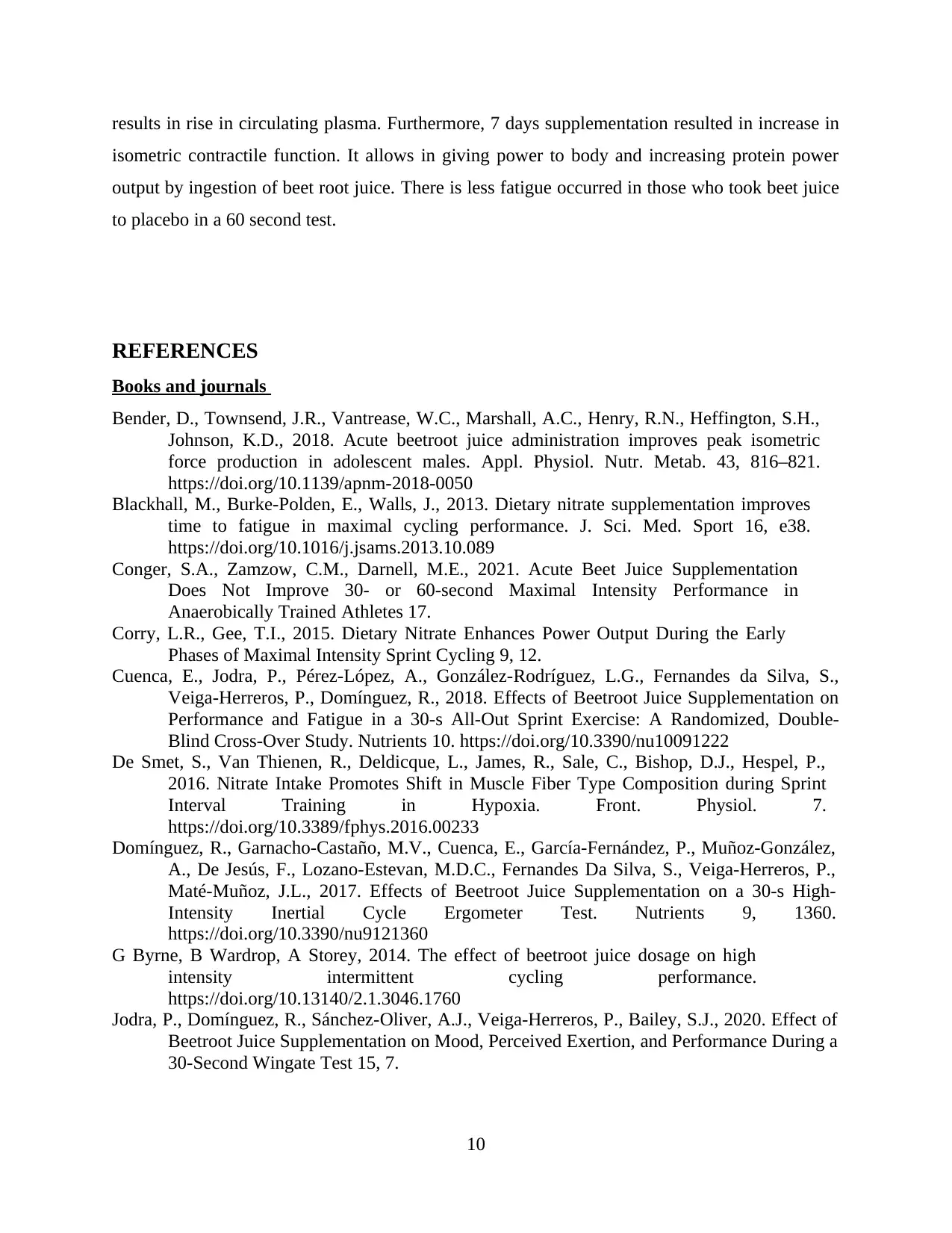
results in rise in circulating plasma. Furthermore, 7 days supplementation resulted in increase in
isometric contractile function. It allows in giving power to body and increasing protein power
output by ingestion of beet root juice. There is less fatigue occurred in those who took beet juice
to placebo in a 60 second test.
REFERENCES
Books and journals
Bender, D., Townsend, J.R., Vantrease, W.C., Marshall, A.C., Henry, R.N., Heffington, S.H.,
Johnson, K.D., 2018. Acute beetroot juice administration improves peak isometric
force production in adolescent males. Appl. Physiol. Nutr. Metab. 43, 816–821.
https://doi.org/10.1139/apnm-2018-0050
Blackhall, M., Burke-Polden, E., Walls, J., 2013. Dietary nitrate supplementation improves
time to fatigue in maximal cycling performance. J. Sci. Med. Sport 16, e38.
https://doi.org/10.1016/j.jsams.2013.10.089
Conger, S.A., Zamzow, C.M., Darnell, M.E., 2021. Acute Beet Juice Supplementation
Does Not Improve 30- or 60-second Maximal Intensity Performance in
Anaerobically Trained Athletes 17.
Corry, L.R., Gee, T.I., 2015. Dietary Nitrate Enhances Power Output During the Early
Phases of Maximal Intensity Sprint Cycling 9, 12.
Cuenca, E., Jodra, P., Pérez-López, A., González-Rodríguez, L.G., Fernandes da Silva, S.,
Veiga-Herreros, P., Domínguez, R., 2018. Effects of Beetroot Juice Supplementation on
Performance and Fatigue in a 30-s All-Out Sprint Exercise: A Randomized, Double-
Blind Cross-Over Study. Nutrients 10. https://doi.org/10.3390/nu10091222
De Smet, S., Van Thienen, R., Deldicque, L., James, R., Sale, C., Bishop, D.J., Hespel, P.,
2016. Nitrate Intake Promotes Shift in Muscle Fiber Type Composition during Sprint
Interval Training in Hypoxia. Front. Physiol. 7.
https://doi.org/10.3389/fphys.2016.00233
Domínguez, R., Garnacho-Castaño, M.V., Cuenca, E., García-Fernández, P., Muñoz-González,
A., De Jesús, F., Lozano-Estevan, M.D.C., Fernandes Da Silva, S., Veiga-Herreros, P.,
Maté-Muñoz, J.L., 2017. Effects of Beetroot Juice Supplementation on a 30-s High-
Intensity Inertial Cycle Ergometer Test. Nutrients 9, 1360.
https://doi.org/10.3390/nu9121360
G Byrne, B Wardrop, A Storey, 2014. The effect of beetroot juice dosage on high
intensity intermittent cycling performance.
https://doi.org/10.13140/2.1.3046.1760
Jodra, P., Domínguez, R., Sánchez-Oliver, A.J., Veiga-Herreros, P., Bailey, S.J., 2020. Effect of
Beetroot Juice Supplementation on Mood, Perceived Exertion, and Performance During a
30-Second Wingate Test 15, 7.
10
isometric contractile function. It allows in giving power to body and increasing protein power
output by ingestion of beet root juice. There is less fatigue occurred in those who took beet juice
to placebo in a 60 second test.
REFERENCES
Books and journals
Bender, D., Townsend, J.R., Vantrease, W.C., Marshall, A.C., Henry, R.N., Heffington, S.H.,
Johnson, K.D., 2018. Acute beetroot juice administration improves peak isometric
force production in adolescent males. Appl. Physiol. Nutr. Metab. 43, 816–821.
https://doi.org/10.1139/apnm-2018-0050
Blackhall, M., Burke-Polden, E., Walls, J., 2013. Dietary nitrate supplementation improves
time to fatigue in maximal cycling performance. J. Sci. Med. Sport 16, e38.
https://doi.org/10.1016/j.jsams.2013.10.089
Conger, S.A., Zamzow, C.M., Darnell, M.E., 2021. Acute Beet Juice Supplementation
Does Not Improve 30- or 60-second Maximal Intensity Performance in
Anaerobically Trained Athletes 17.
Corry, L.R., Gee, T.I., 2015. Dietary Nitrate Enhances Power Output During the Early
Phases of Maximal Intensity Sprint Cycling 9, 12.
Cuenca, E., Jodra, P., Pérez-López, A., González-Rodríguez, L.G., Fernandes da Silva, S.,
Veiga-Herreros, P., Domínguez, R., 2018. Effects of Beetroot Juice Supplementation on
Performance and Fatigue in a 30-s All-Out Sprint Exercise: A Randomized, Double-
Blind Cross-Over Study. Nutrients 10. https://doi.org/10.3390/nu10091222
De Smet, S., Van Thienen, R., Deldicque, L., James, R., Sale, C., Bishop, D.J., Hespel, P.,
2016. Nitrate Intake Promotes Shift in Muscle Fiber Type Composition during Sprint
Interval Training in Hypoxia. Front. Physiol. 7.
https://doi.org/10.3389/fphys.2016.00233
Domínguez, R., Garnacho-Castaño, M.V., Cuenca, E., García-Fernández, P., Muñoz-González,
A., De Jesús, F., Lozano-Estevan, M.D.C., Fernandes Da Silva, S., Veiga-Herreros, P.,
Maté-Muñoz, J.L., 2017. Effects of Beetroot Juice Supplementation on a 30-s High-
Intensity Inertial Cycle Ergometer Test. Nutrients 9, 1360.
https://doi.org/10.3390/nu9121360
G Byrne, B Wardrop, A Storey, 2014. The effect of beetroot juice dosage on high
intensity intermittent cycling performance.
https://doi.org/10.13140/2.1.3046.1760
Jodra, P., Domínguez, R., Sánchez-Oliver, A.J., Veiga-Herreros, P., Bailey, S.J., 2020. Effect of
Beetroot Juice Supplementation on Mood, Perceived Exertion, and Performance During a
30-Second Wingate Test 15, 7.
10
Paraphrase This Document
Need a fresh take? Get an instant paraphrase of this document with our AI Paraphraser
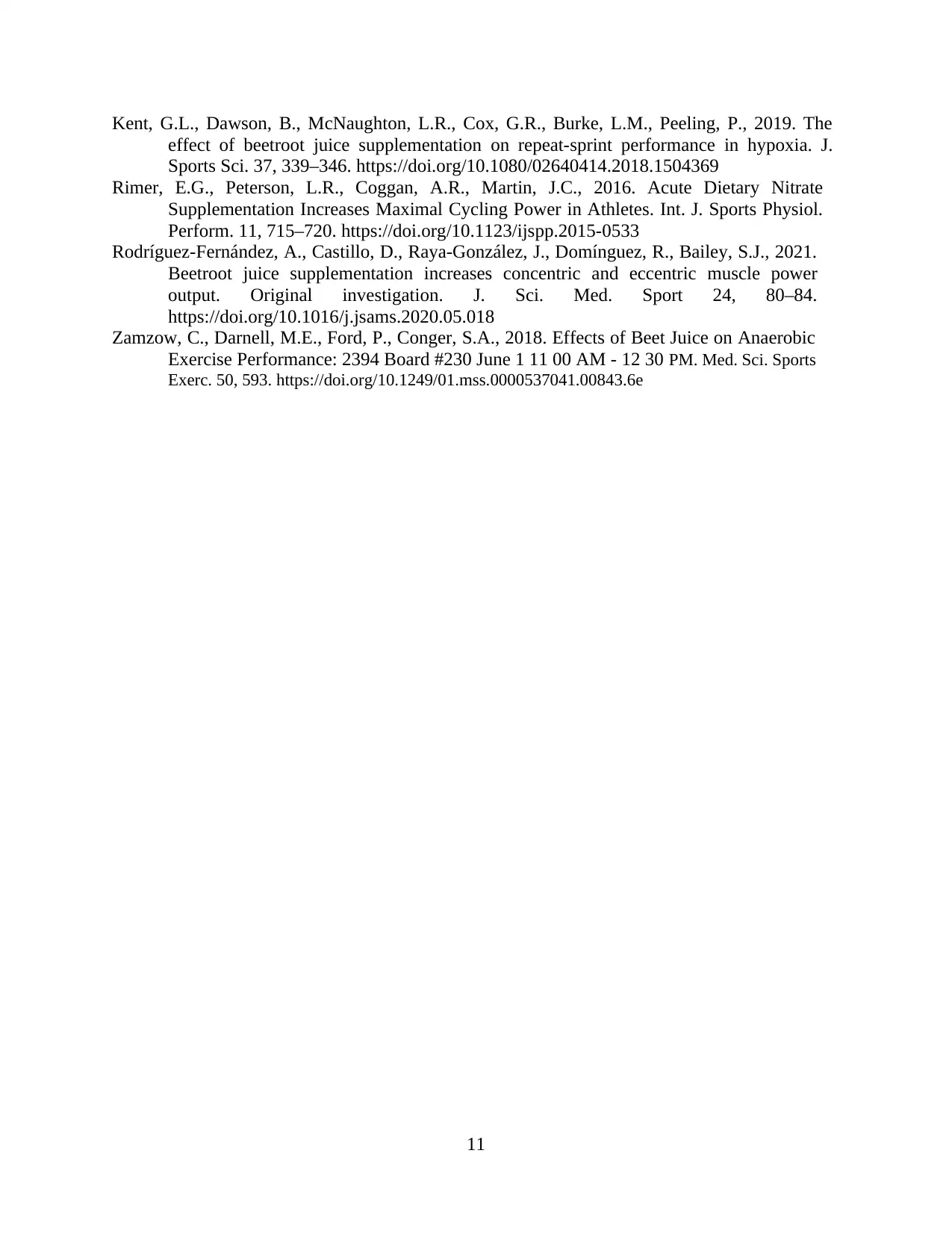
Kent, G.L., Dawson, B., McNaughton, L.R., Cox, G.R., Burke, L.M., Peeling, P., 2019. The
effect of beetroot juice supplementation on repeat-sprint performance in hypoxia. J.
Sports Sci. 37, 339–346. https://doi.org/10.1080/02640414.2018.1504369
Rimer, E.G., Peterson, L.R., Coggan, A.R., Martin, J.C., 2016. Acute Dietary Nitrate
Supplementation Increases Maximal Cycling Power in Athletes. Int. J. Sports Physiol.
Perform. 11, 715–720. https://doi.org/10.1123/ijspp.2015-0533
Rodríguez-Fernández, A., Castillo, D., Raya-González, J., Domínguez, R., Bailey, S.J., 2021.
Beetroot juice supplementation increases concentric and eccentric muscle power
output. Original investigation. J. Sci. Med. Sport 24, 80–84.
https://doi.org/10.1016/j.jsams.2020.05.018
Zamzow, C., Darnell, M.E., Ford, P., Conger, S.A., 2018. Effects of Beet Juice on Anaerobic
Exercise Performance: 2394 Board #230 June 1 11 00 AM - 12 30 PM. Med. Sci. Sports
Exerc. 50, 593. https://doi.org/10.1249/01.mss.0000537041.00843.6e
11
effect of beetroot juice supplementation on repeat-sprint performance in hypoxia. J.
Sports Sci. 37, 339–346. https://doi.org/10.1080/02640414.2018.1504369
Rimer, E.G., Peterson, L.R., Coggan, A.R., Martin, J.C., 2016. Acute Dietary Nitrate
Supplementation Increases Maximal Cycling Power in Athletes. Int. J. Sports Physiol.
Perform. 11, 715–720. https://doi.org/10.1123/ijspp.2015-0533
Rodríguez-Fernández, A., Castillo, D., Raya-González, J., Domínguez, R., Bailey, S.J., 2021.
Beetroot juice supplementation increases concentric and eccentric muscle power
output. Original investigation. J. Sci. Med. Sport 24, 80–84.
https://doi.org/10.1016/j.jsams.2020.05.018
Zamzow, C., Darnell, M.E., Ford, P., Conger, S.A., 2018. Effects of Beet Juice on Anaerobic
Exercise Performance: 2394 Board #230 June 1 11 00 AM - 12 30 PM. Med. Sci. Sports
Exerc. 50, 593. https://doi.org/10.1249/01.mss.0000537041.00843.6e
11
1 out of 11
Your All-in-One AI-Powered Toolkit for Academic Success.
+13062052269
info@desklib.com
Available 24*7 on WhatsApp / Email
![[object Object]](/_next/static/media/star-bottom.7253800d.svg)
Unlock your academic potential
Copyright © 2020–2026 A2Z Services. All Rights Reserved. Developed and managed by ZUCOL.

